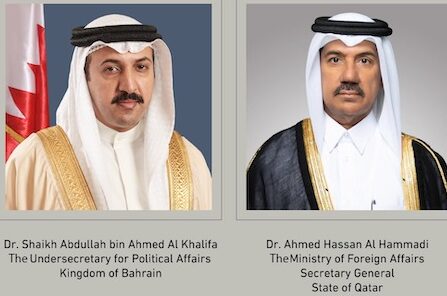
al-Fateh grand mosque in Manama, Bahrain
Riyadh/Washington: Bahrain and Qatar today decided to resume diplomatic relations between the two countries in accordance with the principles of the United Nations Charter and the provisions of the Vienna Convention on Diplomatic Relations, 1961. The decision was taken during the Bahraini-Qatari Follow-up Committee’s second meeting at the headquarters of the Gulf Cooperation Council (GCC) General Secretariat here in Saudi Arabia today.
The two sides confirmed in a joint press release that this decision “stems from the mutual desire to develop bilateral relations and enhance GCC integration and unity in accordance with the purposes of the GCC Statute, and respect for the principles of equality between states, national sovereignty and independence, territorial integrity, and good neighbourliness”.

The Bahraini delegation was headed by the Undersecretary for Political Affairs, Dr Shaikh Abdullah bin Ahmed Al Khalifa and the Qatari delegation was headed by the Ministry of Foreign Affairs Secretary General, Dr Ahmed Hassan Al Hammadi.
The meeting discussed the agenda topics, and the two sides reviewed the outcomes of the first meeting of the Joint Legal Committee and the Joint Security Committee. It may be mentioned that Bahrain has formed two committees, (a follow-up committee and a legal committee), as stipulated in the Al-Ula statement.
Earlier, on February 7, 2023, the foreign ministers of both countries in a meeting here had explored the establishment of the necessary mechanisms and procedures to launch discussions at the level of bilateral committees, in accordance with the Al-Ula Declaration issued at the Al-Ula Summit in the Kingdom of Saudi Arabia on January 5, 2021, to end the pending files between the two countries. In course of the meeting, the two sides reaffirmed the importance of close cooperation between the two countries in a way that “enhances fraternal relations, and achieves the aspirations of their peoples for security, stability and development, and supports the path of joint action of the Cooperation Council for the Arab States of the Gulf”.
It may be mentioned that within a week after the Al-Ula Summit, on January 11, 2021, Bahrain’s foreign ministry sent an invitation to the Qatari foreign ministry to send an official delegation to the Kingdom of Bahrain as soon as possible, to start bilateral talks between the two sides on issues and pending matters between the two countries, in order to implement Al-Ula Declaration. However, there was much delay, which Bahrain attributed to the delay by both sides in formalising a dispute resolution mechanism. In February 2022, Bahrain’s Minister of Foreign Affairs, Dr Abdullatif bin Rashid Al Zayani, told newspaper editors that Bahrain had no disagreement over a dispute mechanism with Qatar on remaining unresolved issues, in line with the Al-Ula communiqué. He had then mentioned that Bahrain extended three invitations to the Qatari side that were yet to be responded to, and suggested holding bilateral technical meetings at the GCC Secretariat in Riyadh. The GCC Secretary General too had communicated Bahrain’s proposal to Doha, then.
The feud between Bahrain and Qatar dates back to June 5, 2017, when Bahrain, Saudi Arabia, the United Arab Emirates and Egypt, imposed a diplomatic blockade on Qatar because of the latter’s closeness to Iran, its support to “terrorism”. They also accused Doha of meddling in the internal affairs of their countries. Doha always denied these allegations. Finally, the four nations lifted the blockade after three and half years in January 2021, but that could not translate into Doha and Manama immediately sitting together to resolve their differences.
Meanwhile, the United States today congratulated its “key partners” Bahrain and Qatar on their decision to resume diplomatic ties. “This breakthrough represents a crucial step in our collective efforts to forge a more integrated, stable, peaceful, and prosperous region. The United States has sought to promote regional integration and de-escalation, including among these two important partners and Gulf Cooperation Council member states,” a US State Department spokesperson said. He stressed that the United States will continue to “actively work with regional partners to advance this shared aim of a more integrated, stable, and prosperous Middle East region”.
– global bihari bureau




